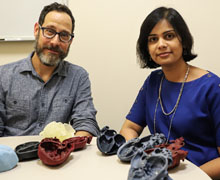Creating Custom Solutions for Patients with 3D Models
 A doctor has just delivered a life-changing diagnosis to a patient’s family. It stops them in their tracks. They struggle to understand specific details during a complicated, emotional conversation. What can be done in that moment to bring clarity and ease fear?
A doctor has just delivered a life-changing diagnosis to a patient’s family. It stops them in their tracks. They struggle to understand specific details during a complicated, emotional conversation. What can be done in that moment to bring clarity and ease fear?
With grant support from Seattle Children’s Cardiology department, two Seattle Children's team members are attempting to answer that question. Drs. Seth Friedman, manager of Innovation Imaging and Simulation Modeling, and Sujatha Buddhe, associate professor of pediatrics, saw an opportunity.
Their process included identifying what they know to be true:
- Explaining a complex diagnosis to an overwhelmed family is tough.
- Evidence suggests that information can be lost between what a family hears versus what a physician
- Drawings and computer images don’t translate directly into a three-dimensional element, such as a human heart.
- Beyond families, medical students and residents are challenged to grasp anatomy quickly when relying only on images.
None of this is surprising, as a human heart is a living organism not easily captured in an image.
Friedman and Buddhe started printing 3D cardiac models to address these issues.
By printing 3D cardiac models, families, physicians and students can physically hold what’s being referenced. The human heart becomes real. It’s tangible. Parents can see the effects of a disease. Medical students can observe the structures and intricacies.
Custom care supports Seattle Children’s mission of providing exceptional care to patients and families. That means consistently finding ways to improve and innovate. 3D models help our physicians better understand the intricacies of a particular organ or anatomy. Making simulations and training as real-world as possible leads to better and safer care. We can make an even bigger impact by providing unique experiences that families don’t expect – such as handing them a physical object replicating a very personal disease.
Innovation at Seattle Children’s allows us to make breakthroughs in custom solutions for patients and their families. If you’d like to get involved in this transformative work, please email us.